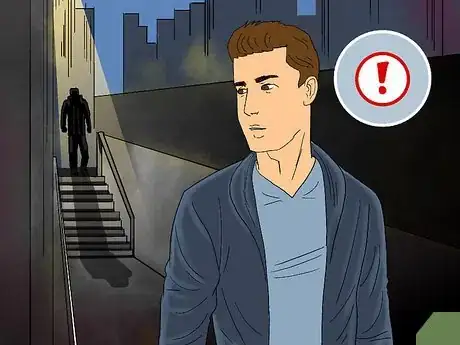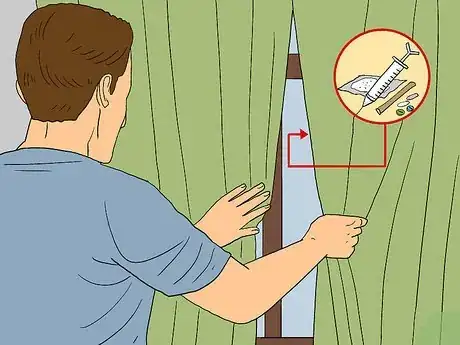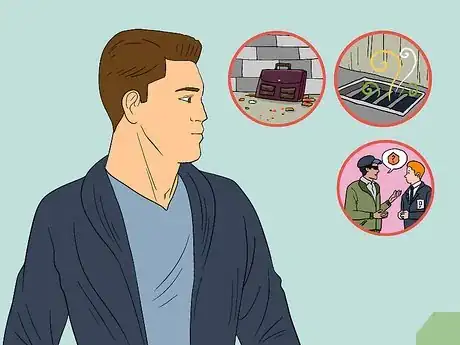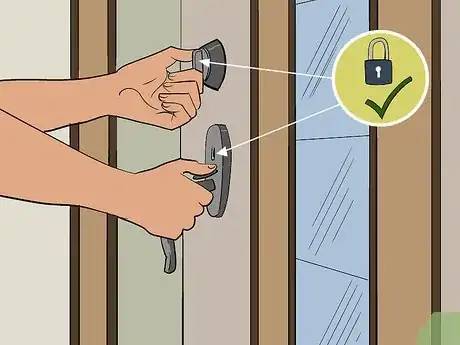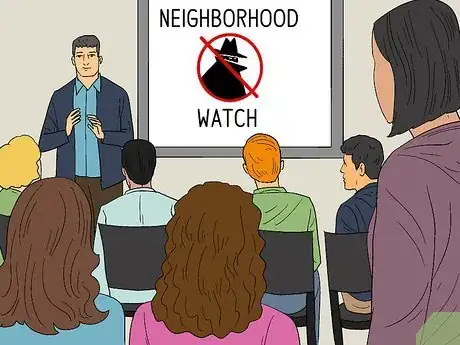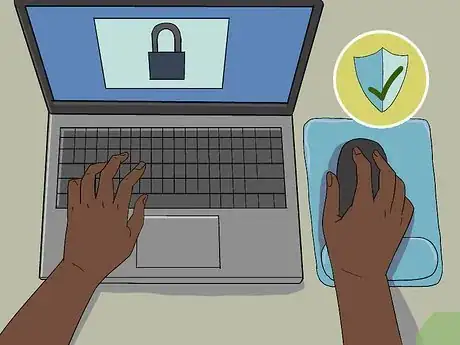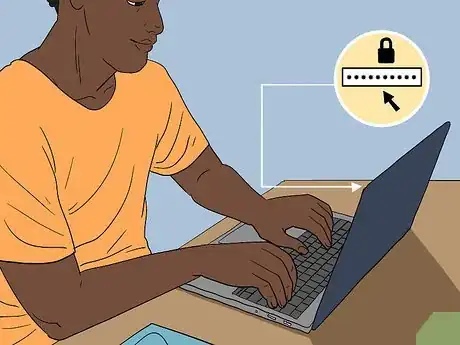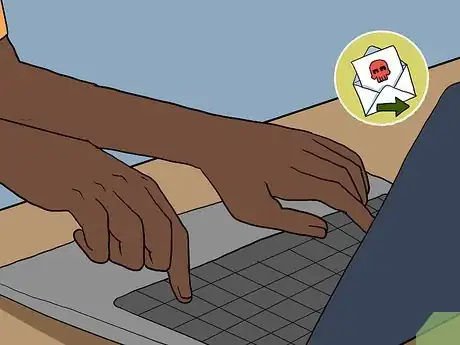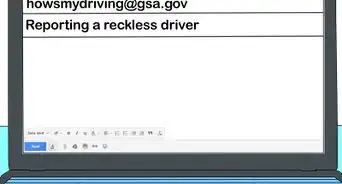This article was co-authored by Saul Jaeger, MS. Saul Jaeger is a Police Officer and Captain of the Mountain View, California Police Department (MVPD). Saul has over 17 years of experience as a patrol officer, field training officer, traffic officer, detective, hostage negotiator, and as the traffic unit’s sergeant and Public Information Officer for the MVPD. At the MVPD, in addition to commanding the Field Operations Division, Saul has also led the Communications Center (dispatch) and the Crisis Negotiation Team. He earned an MS in Emergency Services Management from the California State University, Long Beach in 2008 and a BS in Administration of Justice from the University of Phoenix in 2006. He also earned a Corporate Innovation LEAD Certificate from the Stanford University Graduate School of Business in 2018.
There are 15 references cited in this article, which can be found at the bottom of the page.
This article has been viewed 75,762 times.
You don't have to join the police to fight crime. Crime appears in all kinds of ways in the modern world, and you have a role to play in helping to stop it. Crime can strike your home, your neighborhood, and even through your computer, and there are many steps you can take to make yourself secure.
Steps
Protecting Yourself
-
1
-
2Watch for suspicious drug activity. Drug houses, where illegal drugs are bought and sold, can appear in any kind of neighborhood, especially ones where people are generally isolated. If you notice the signs of drug activity surrounding a house in your neighborhood, take note, and contact the police. These can include:[3]
- Excessive or unusual foot traffic around a house. This can involve many people coming and going, people loitering around, or frequent visitors quickly entering and leaving.
- Frequent traffic stops, especially if someone from the house comes out to talk to these cars.
- Threatening activity, including obvious intimidation and violence, or a sudden increase in criminal activity around the house.
- The direct exchange of drugs and money.
Advertisement -
3Watch for suspicious terrorist activity. Keep an eye out for strange or unusual situations that can indicate a crime or potential crime involving terrorism. These can include:[4]
- Unattended briefcases, suitcases, backpacks, or other packages.
- Unusual smells or fumes.
- Strangers asking questions about security procedures, or taking photos or videos of a building's security features.
-
4Get details about any crime you witness. In order to help, police will need as much detail as possible. Get as much information as you can to share with law enforcement. If possible, be sure to include:
- The crime being committed.
- The crime's location. A physical address is good, but you can also note important landmarks nearby. If you are in an urbanized area, the nearest cross streets are good to know.
- A description of the suspect. Look for any kind of distinguishing physical characteristic, including height, weight, build, skin and hair color, and physical markings (like scars or tattoos). You don't need all of these things, but the more detail you can get, the better it will be.
- Any items in use. Are the criminals armed? Do they have tools to carry out the specific crime they are committing?
- A description of the victim. This can be the person being victimized, or the building, in the case of vandalism, breaking and entering, and other types of property crime.
-
5Contact local law enforcement. If an emergency is imminent, dial 9-1-1. If not, contact your local police department. When you report a crime, be sure to have all the details ready.
- If you have information relating to a federal crime, such as violent crime, child pornography, human trafficking, terrorism, drug trafficking, and fraud, contact the FBI or Department of Justice.
Securing Your Home and Neighborhood
-
1Lock your doors and windows. There is no need to make it easy for burglars and others to break in. Get in the habit of locking up when you leave or enter your home, and before going to bed. Make sure all potential entrances to your home can be secured.[5]
- If you have a spare key, don't leave it hidden somewhere outside your home. It's best to leave it with a friend or trusted neighbor.
-
2Protect your valuables. Keep valuable objects, such as electronics, artwork, and jewelry away from windows. Don't allow potential thieves to "window shop," by seeing what you have. You may consider investing in a safe to store valuables inside your home. At the very least, put house and car keys somewhere out of sight, like in a drawer.[6]
-
3
-
4Get a home alarm system. There are a variety of home alert systems out there, designed for many different homes and living situations. Make sure you chose one that best fits your needs. Things to consider include how the alarm will connect to a monitoring system, how you want it installed, and any additional home automation features you might want.[9] [10]
-
5Protect your home when you are not around. If you are going to be gone for a while, take steps to make it look like you are still at home. Arrange for your mail or newspapers to get picked up. Consider purchasing a timer for lights or electronic devices so that they are not always off.[11]
-
6Get to know your neighbors. Introduce yourself to the people who live around you, and learn a little bit about them.[12] [13]
- Learn if any of your neighbors have surveillance or security cameras. This kind of information can be helpful to police who need video evidence that a crime has been committed in your area.
-
7Hold community meetings. If you are concerned about a rise in crime, get people in your neighborhood together to discuss their problems and ways you can work to solve them. It will probably be best to identify a few problems you can deal with first, though as you talk, you may find that many neighbors will have similar crime concerns.[14]
- Pre-existing groups like church organizations or social clubs (Rotary or Lions, for example) can form the basis of an anti-crime organization.
- Invite the police to your meetings as well. They can help provide additional information you need to fight crime in your neighborhood, and set up specific ways for people to report crimes anonymously.
-
8Hold an anti-crime vigil or march. If you have a community group together, you can take public steps to protest crime. Choose a location where a large number of people can gather, and is in a visible public place. Since you are protesting on behalf of your community's safety, a notable civic landmark can be a good location. Arrange for local figures, such as police, politicians, crime victims, or clergy, to speak about the problems of local crime, and how you can stop it.[15]
-
9Form a neighborhood watch. You and your neighbors can work together to help the police keep your neighborhood safe. Recruit others in your area to discuss community concerns and watch for crimes. Create plans for watching your neighborhood and communicating issues. Be sure to involve local law enforcement, as your watch group will be working closely with them.[16]
Fighting Cyber Crime
-
1Install security software. There are a number of good products out there that will keep your computer secure. Make sure your computer always has an up-to-date security system. If it gives you the option to update automatically, take it.[17]
- Don't buy new software because of a pop-up or other advertisement claiming to have found viruses or malware on your computer. This is just another scam to allow hackers access to your computer.
-
2Create strong passwords. The traditional advice is to make your password a combination of upper and lower-case letters, numbers, and symbols. Keep your passwords in a secure place, and only enter them on secure websites.[18]
- Another way you can create a strong password is to take the first letter of each word, plus numbers and symbols, in two simple sentences. For example, the phrase "My first pet was a dog named Fido. Got him in 1993." would become the password "MfpwadnF.Ghi1993." It is long, and has a mixture of upper and lower case letters, numbers, and symbols. Since it doesn't read as any word that would appear in a dictionary, it is harder for someone else to figure out. Plus, since it can refer to a sentence only you know, it should be easier for you to remember.[19]
-
3Don't respond to phishing or spamming emails. Never provide personal or financial information through email or unsecure websites. Legitimate businesses will not ask for your personal information over email or text.[20]
- Many of these emails will seem legitimate, or threaten to take action against you if you do not respond. Don't panic, and don't respond to these messages.
-
4Contact the appropriate authorities. The Federal Trade Commission's (FTC) ComplaintAssist website, https://www.ftccomplaintassistant.gov/#crnt&panel1-1, allows you to report phishing or other spamming schemes. You can also forward phishing emails to the company being impersonated, and to the Anti-Phishing Working Group at reportphishing@antiphishing.org.[21]
-
5Review your bank statements. Most cybercrime is designed to steal your identity to order to steal money. Keep an eye out for any unusual purchases. If you notice something out of the ordinary, contact your bank or credit union as soon as possible.[22]
Community Q&A
-
QuestionIs it possible to fight back someone who is armed?
 Community AnswerRun if they are armed. If that is not an option, fight for you life.
Community AnswerRun if they are armed. If that is not an option, fight for you life. -
QuestionCan I actually fight crime the way fictional superheroes do?
 Community AnswerYes, you could, but it wouldn't be the safest or best thing to do. Fictional superheroes do not have to worry about getting injured, arrested or killed.
Community AnswerYes, you could, but it wouldn't be the safest or best thing to do. Fictional superheroes do not have to worry about getting injured, arrested or killed. -
QuestionHow I can report someone but stay anonymous?
 Community AnswerWrite a note and sign it "Anonymous" or place a phone call without giving your name.
Community AnswerWrite a note and sign it "Anonymous" or place a phone call without giving your name.
Warnings
- Your first priority to fighting crime should be to keep yourself safe. You should only intervene if there is a serious threat of physical harm to you or someone else. Even if the crime seems non-violent, it is better to call the police and let them deal with it.⧼thumbs_response⧽
References
- ↑ http://www.aacc.edu/publicsafety/Prevention.cfm
- ↑ Saul Jaeger, MS. Police Captain, Mountain View Police Department. Expert Interview. 21 February 2020.
- ↑ http://www.accesskansas.org/kbi/info/docs/pdf/Is%20That%20House%20a%20Drug%20House%20brochure.pdf
- ↑ http://dfw.cbslocal.com/2015/11/19/dps-says-how-texans-can-help-fight-crime-and-terrorism/
- ↑ http://www.consumerreports.org/cro/news/2014/06/14-ways-to-make-your-home-more-secure/index.htm
- ↑ http://www.consumerreports.org/cro/news/2014/06/14-ways-to-make-your-home-more-secure/index.htm
- ↑ http://www.iii.org/article/securing-your-home-against-burglary
- ↑ Saul Jaeger, MS. Police Captain, Mountain View Police Department. Expert Interview. 21 February 2020.
- ↑ http://www.safewise.com/resources/how-to-choose-security-system
- ↑ Saul Jaeger, MS. Police Captain, Mountain View Police Department. Expert Interview. 21 February 2020.
- ↑ http://www.iii.org/article/securing-your-home-against-burglary
- ↑ http://www.safewise.com/blog/5-ways-team-neighbors-keep-crime-bay/
- ↑ Saul Jaeger, MS. Police Captain, Mountain View Police Department. Expert Interview. 21 February 2020.
- ↑ https://www.lapdonline.org/getting-together-to-fight-crime/
- ↑ http://www.usccb.org/prayer-and-worship/prayers-and-devotions/prayers/how-to-plan-a-vigil.cfm
- ↑ http://www.nnw.org/register-watch
- ↑ https://www.onguardonline.gov/articles/0009-computer-security
- ↑ https://www.onguardonline.gov/articles/0009-computer-security
- ↑ http://www.howtogeek.com/195430/how-to-create-a-strong-password-and-remember-it/
- ↑ https://www.onguardonline.gov/phishing
- ↑ http://www.consumer.ftc.gov/articles/0003-phishing
- ↑ https://www.onguardonline.gov/articles/0009-computer-security
